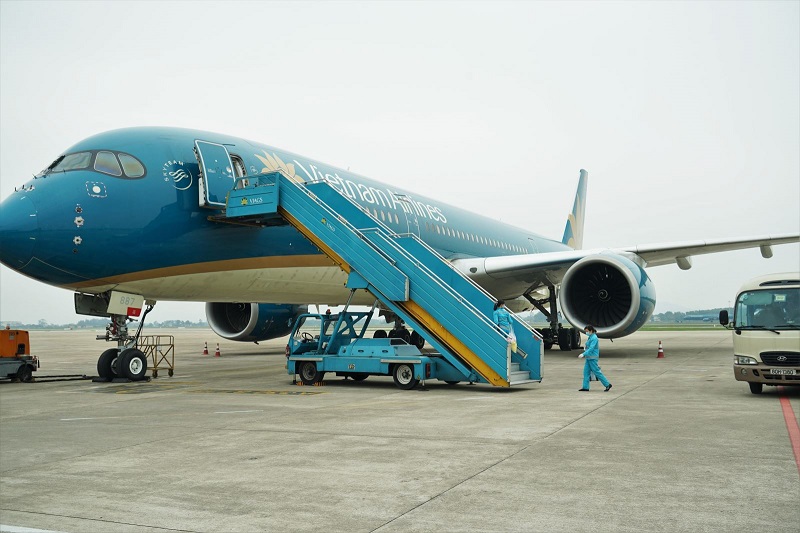CAAV proposes to resume domestic flights amid pandemic
The proposal aims at maintaining air transport and promoting economic recovery for localities.
The Civil Aviation Authority of Vietnam (CAAV) has proposed to resume domestic flights in a safe manner amid the pandemic, basing on the levels of Covid-19 risks, according to CAAV Director Dinh Viet Thang.
Under the CAAV’s draft, 22 airports across the country would be classified into three groups, denoted by three colors: green group, which comprises airports in cities and provinces that are not under social distancing measures, yellow group (airports in localities which are partly under social distancing measures) and red group (airports in localities under strict social distancing measures).
Flights between green airports and yellow and red airports are not subject to capacity limitations. Passengers only need a negative result from a Covid-19 test conducted within the last 72 hours to fly.
Passengers on business trips and personnel serving pandemic prevention and control flying from yellow and red zones must show negative Covid-19 testing results within 72 hours.
Flights between red zones only serve passengers traveling on business purposes and those serving the Covid-19 combat as well as passengers permitted by authorities of localities where they come from/to. All passengers must have valid negative Covid-19 test results.
Passengers flying from cities and provinces that are applying total social distancing rules must get written consent from localities of departure and arrival to fly.
Vietnam’s airlines are facing difficulties during the Covid-19 pandemic. Photo: Tuan Anh |
CAAV wanted to build a mechanism that allows airlines to set up their operation plans while creating favorable conditions for the transport of personnel and medical supplies serving the pandemic prevention and control, and helping remove difficulties for airlines.
It is also aimed at maintaining air transport, promoting economic recovery for localities, and removing difficulties for businesses, Thang stressed.
Thang said CAAV has been collecting feedback from local carriers before submitting it to the Ministry of Transport for approval. If the proposal is approved, Vietnamese airlines will be able to operate domestic routes with no restriction on the operating frequency.
Since July, the CAAV had requested airlines to limit the number of flights from localities under social distancing rules to Hanoi over coronavirus threats. In the Hanoi-HCMC flight route, an important one, the number of flights had been limited to two a day at maximum.
Moreover, the CAAV on August 31 requested airlines to stop selling tickets for domestic flights until further notice.
Vietnam has begun closing its borders and canceled international flights since March last year, excepting the entry of certain categories of visitors meeting strict Covid-19 quarantine requirements.
Opportunity for the aviation industry to recover
Domestic commercial flights in Vietnam can be resumed thanks to vaccine passports. Photo: Tienphong.vn |
After two consecutive years of devastating the world economy, the Covid-19 pandemic has been gradually put under control in many countries thanks to a large-scale vaccination campaign.
The Vietnam Airlines Corporation in early 2021 forecast that the revenue of airlines would plunge year-on-year with the loss of VND15 trillion (US$ 657.7 million) in the passenger transportation segment. Due to the increasingly serious evolution of the Covid-19 disease lately, it is certain that the actual loss forecast of airlines will be much bigger.
“The statistics on the damage of the aviation industry show that the resistance of aviation enterprises has reached the limit and this is the time to come up with solutions to rescue the aviation industry before they could no longer stand,” Dr. Nguyen Thien Tong, an aviation expert, told The Hanoi Times.
“I have talked about this many times. The aviation industry can only recover when airlines are allowed to fly again. For airlines, banning flights is like pulling out their breathing tubes. Deploying vaccination on a large scale and considering the use of vaccine passports are the medicine for the aviation industry to recover," Tong said.
Sharing the same view, Dr. Ngo Tri Long, an economic expert, said that, among the fields affected by Covid-19, aviation is one of the areas that need to be prioritized for being saved. If not, it will lead to extremely serious consequences for the country’s economy.
"With the positive developments in Covid-19 vaccination over the past time, the opportunity for Vietnam’s aviation economy to recover is relatively bright. Even the resilience of our country's aviation industry is higher than the common level of the world," Long said.













